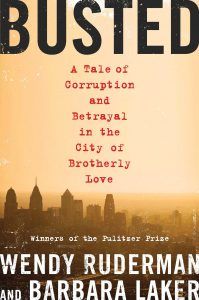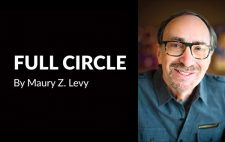While interviewing the mother of a female drug informant, Barbara Laker suddenly found herself being attacked by the informant herself. In an instant, the journalist understood the dangers of life as an investigative reporter, especially when covering corruption in the Philadelphia Police Department.
“The mom was telling me the story about how one of the cops involved in this investigation had brought bail money – $300 in all these crumpled ones – to bail out her daughter, Tiffany, who was a drug informant working with him,” recalls Laker, 57. “I was excited because I knew this was evidence of one other inappropriate thing this cop had allegedly done with a drug informant. I was scribbling in my notebook really fast and all of a sudden I heard Tiffany barrel down the steps.
“She ran toward me and said, ‘I’m gonna f-ing kill you.’ She had these big rings on her fingers and she slapped me against one side of my face and then the other side of my face really, really hard. Then she threw my notebook across the room. I knew then it was time for me to get out of there.”
Laker’s saga began in December 2008 and is now chronicled in the book “Busted: A Tale of Corruption and Betrayal in the City of Brotherly Love,” co-written with Philadelphia Daily News colleague Wendy Ruderman. Their story began when Benny Martinez, a longtime drug dealer turned drug informant, met with Ruderman, 45, with claims of abuse of power by the Philadelphia narcotics squad.
“To be a drug informant you get paid through the police department if the cops find drugs or guns during a bust,” says Laker. “The informant makes a drug buy in front of the cop. The cop sees the buy and can then apply for a search warrant to that home, and then there’s a raid.”
But according to Martinez, a rogue police officer was lying on search warrants. And that was just the tip of the iceberg, Martinez insists. With his help, the reporters also discovered that officers were terrorizing immigrant shop owners and looting their businesses.
“After the first couple articles ran, we got a call from an attorney saying his client who owned a smoke shop told him cops raided his store, busted the surveillance cameras and cut the wires. After the cameras went dark, they took money and merchandise,” says Laker.
“We found search warrants where this one narcotics squad had raided stores and bodegas. Wendy and I asked them what happened and they all told us in different languages – they were from all parts of the world – the exact same story.”
Beyond falsifying warrants and robbing merchants, the women discovered that an officer was also sexually assaulting women during raids. “That was the hardest part to uncover,” recalls Laker.
“We pulled every single warrant where this particular cop had been on the raid and knocked on hundreds upon hundreds of doors in the city trying to track down women who had been at home during the raid when this officer had been in the house. We ended up finding three women who didn’t know each other but told us very similar stories about what this police officer had done to them.”
The articles began running in the Daily News in February 2009, and for the next 10 months, readers learned what Ruderman and Laker had uncovered. While the articles received great attention, even from the FBI, no criminal charges were brought against the officers.
“But Internal Affairs did sustain some very serious internal allegations against the officers,” says Ruderman, who lives in Haddon Heights. “One officer was fired for fabricating evidence on a search warrant, living in the informant’s home – he was renting a room out to Martinez – and lying to investigators. Another officer got administrative charges for giving free merchandise, basically anything you’d find on the shelf in a bodega, to their informants. So there were suspensions.”
While they are disappointed more severe punishments weren’t handed down, the journalists are proud of their work. “We gave the victims a voice,” says Laker.
“Even though the officers didn’t face criminal charges, certainly the activities they were doing ceased once we started writing about them, and that was the goal,” adds Ruderman.
The icing on the cake was the Pulitzer Prize the women won in 2010 for their series. “We didn’t write the series with an award in mind, so winning the Pulitzer was an utter surprise,” says Ruderman.
“It validates you as a reporter,” adds Laker. “Someone said, ‘Now you know the first line of your obituary.’ That’s something you carry with you, and you still can’t believe you’re in this club.”
The journalists were dealt a difficult blow recently when an article in The Philadelphia Inquirer (owned by the same company as the Daily News) challenged one of their witnesses. “There were crazy allegations that we had showered this woman with gifts and money, and that Barbara tried to get her babies adopted. I’ll never understand why they felt that was a big story – it wasn’t true,” insists Ruderman. “It infuriates me and soured me on the trade.”
“If you’re going to throw something out there that can tarnish someone’s reputation, you have to believe it to be true and know what the allegations are and the motive for someone to lie,” adds Laker. “If we had thought for one second that someone was lying to us when they alleged something had happened to them, we would never use it.”
 After receiving the Pulitzer, the women began getting calls from Hollywood producers, asking to buy the rights to their story. Colleagues advised them to write a book first, which would allow them greater control if the book moved to the screen. That was good advice. A limited television series is now in the works starring Sarah Jessica Parker as Ruderman. Laker’s role has yet to be cast. The pair recently met Parker for lunch in Philadelphia.
After receiving the Pulitzer, the women began getting calls from Hollywood producers, asking to buy the rights to their story. Colleagues advised them to write a book first, which would allow them greater control if the book moved to the screen. That was good advice. A limited television series is now in the works starring Sarah Jessica Parker as Ruderman. Laker’s role has yet to be cast. The pair recently met Parker for lunch in Philadelphia.
“She’s so warm,” says Laker. “We made a reservation at a nicer restaurant in Philadelphia but she said, ‘No, I just want to go where you guys would normally go.’ So we took her to Coco’s, this bar/restaurant up the street, and she loved it. She got out of the car and walked all through the drug neighborhood.”
“It’s freaking awesome,” says Ruderman. “It’s incredibly surreal.”
David Frankel, who directed movies “The Devil Wears Prada,” “Marley & Me,” and the HBO series “Entourage,” is set to direct the pilot and serve as executive producer, and Don Roos, screenwriter of “Marley & Me,” will pen the pilot.
“Don Roos is writing it based on the book, with Wendy and I as the main characters,” says Laker. “They say they are going to follow the book very closely.”
“There are going to be three plots interwoven. One is Barbara and I as characters and our personal life and home life. The second is against the backdrop of the failing newspaper industry, the struggle with print media and the struggles in the newsroom financially. And on top of that, me and Barbara going into these neighborhoods with these characters, drug dealers, police officers and shop owners. It’s going to intertwine.”
The duo hopes that readers of the book and viewers of the TV series will mostly be entertained. “I hope it will be fun, intriguing, and have some mystery and funny moments,” says Laker.
“I hope the book sparks a love and appreciation for journalism, for what it is we do and the importance of it,” adds Ruderman. “It really is the story behind the story, and we take you by the hand into this world. It’s fascinating how the story unfolds. The best compliment I’ve received from reporters who have read it is that it made them fall back in love with what they do at a time when we feel a little beaten down by the way the industry is going.”












